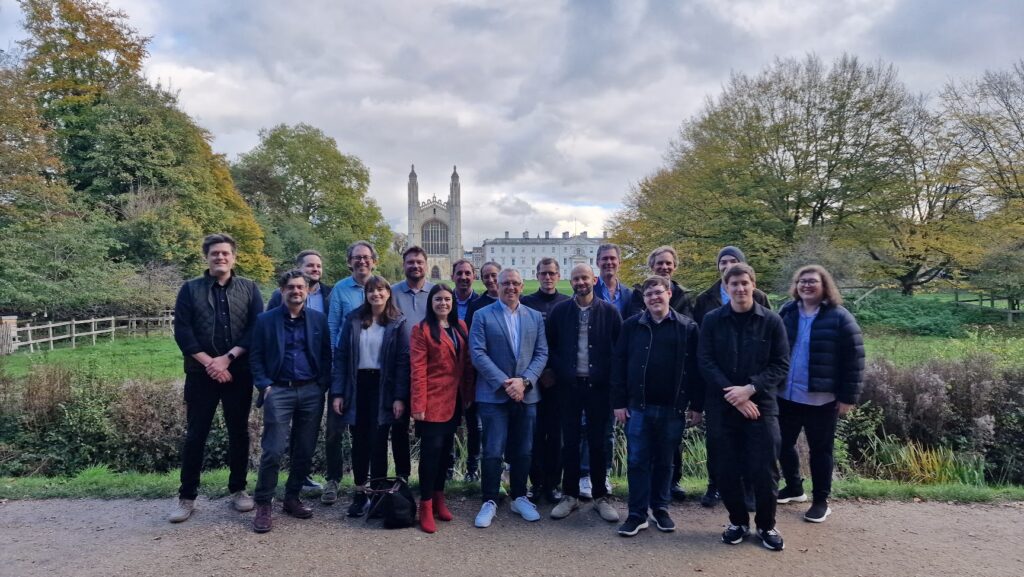The UK Digital Leaders 2024 meeting at Cambridge: a recap
Earlier this week, Emma Horrell, User Experience Manager, and I travelled to Cambridge to attend the annual Digital Leaders meeting, hosted at the University of Cambridge. Janus Boye has been organising and facilitating similar meetings for several years, and there were some very interesting discussions related to leading and managing digital services and products. My highlights include the uncanny similarities between Cambridge University’s website service journey, the upcoming European Accessibility Act, and the constant need to take a few steps back to think longer term strategy.
An ongoing discussion about digital
Having been attending related events and discussions over a period of years, it’s easy to realise that “current” hot topics are not fundamentally different from those raised in previous years or even the dawn of digital (or time in some cases). The objectives of developing a successful longer-term strategy, prioritising and managing appropriate projects to support the business of an organisation, delivering the best possible user experience, ensuring regulation compliance and taming the available technology to achieve these goals have not really changed over the years. What is changing is the parameters around these areas, and that’s why it’s important to be included in discussions with fellow colleagues working in the expanding world of digital services and products.
For one more year, all of the day was full of interesting presentations and discussions. My top-3 highlights were:
The not-so-unique challenges in Higher Education
The UK Digital Higher Education community has always been open for sharing the challenges of managing large, devolved web estates. That’s very common for our teams in Edinburgh, and Cambridge University is no different. Barney Brown, Head of Digital Communications and Deputy Director, and William Kerslake, Web Experience Manager, both from the University of Cambridge, presented a high level view of managing a 500-strong website estate as a centralised team. Their data and findings were very familiar, including the long tail of websites that are rarely updated and visited, dysfunctional user journeys, lack of updated golden sources of truth, and non-engaged website owners and editors. Nothing surprising there. What was inspiring, though, was the plan of action being taken to address these issues, including auditing website content freshness, accuracy and regulatory compliance, and triggering action to update or remove it. I, for one, will definitely continue to keep an eye and keep in touch with the Cambridge’s team progress and relate to our own efforts on the same fields.
Achieving “big” objectives
As part of the day, there has been discussion about the risks of planning and running large, multi-year change programmes of work, yet this remains the main way to achieve significant organizational change. Big projects will be staying with us for some time longer, and Morten Elvang, who has vast experience working with global organisations, led an excellent, and interactive, presentation on how to approach the planning and execution of such project. It was interesting to pick up a chat around what “big” means, and whether it is cost, impact or cultural change that makes it “big”. Overall, one of the quotes that resonated with me, and summarised the discussion, was “think slow, act fast”. I would add “and be flexible to pivot” to complete the approach.
More accessibility regulations coming up, and that’s a great thing
The European Union has a track record of successfully introducing regulations for digital in recent years, most prominently General Data Protection Regulation (GDPR). Gavin Colborne presented an update regarding the upcoming European Accessibility Act (EAA) is aimed to tighten the standards for digital accessibility. Following the example of GDPR, this act will apply to all business and organizations that address EU citizen audiences even if they are not based in a EU country, and include severe penalties for non-compliance. Acknowledging the success of GDPR in improving the privacy performance of digital products, including websites, the development of this act is great news. Our ethos has always being supportive for digital accessibility, but having this act will offer more concrete arguments to improve accessibility performance and comply with the requested standards across our website estate.

The attendees of UK Digital Leaders 2024 had a chance to walk around the very beautiful Cambridge University campus during lunch time.

